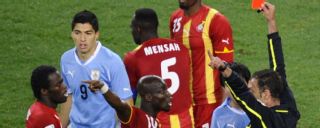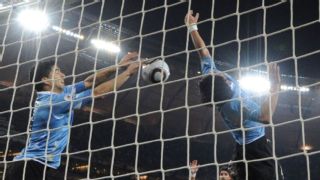 African football has stepped into a new decade, so ESPN remembers the defining moments of the past 10 years. The Hand of Suarez African football entered the previous decade upon a wave of optimism and amidst talk of a 'new dawn', with the continent set to host its first World Cup in 2010. South Africa got the nod, and opened the tournament in some style - with Siphiwe Tshabalala's unforgettable thunderbolt against Mexico - but in truth, Africa's challengers largely fell short of the expectations that had accompanied them to the Rainbow Nation. Didier Drogba's injury and a tricky draw saw the Ivory Coast eliminated in the first round, Nigeria's primary contribution was Aiyegbeni Yakubu's horror miss against South Korea, while Algeria and Cameroon took one point between them across six group games. The only exceptions - and what exceptions they were - were Ghana, who built on their Last 16 elimination in 2006 to stun Serbia in Pretoria, and then draw with Australia in Rustenburg to advance to the knockouts again. With Michael Essien absent through injury, Asamoah Gyan headlined a young, vibrant selection, scoring the winner in the opener, the equaliser against the Socceroos, and then the extra-time winner against the United States in the Second Round as Ghana became just the third African nation to reach the final eight on the grandest stage of all. As the tournament progressed, Ghana - Africa's last team standing - became a symbol for the continent's own collective footballing fortunes, with the team drawing a pan-African fanbase. So to vuvuzela-drenched Soccer City, a quarter-final against Uruguay, and one of the most controversial matches in World Cup history. Diego Forlan cancelled out Sulley Muntari's opener, and while Ghana rode their luck at times during the 90 minutes, they also troubled the South Americans going forward, with Kevin-Prince Boateng and Kwadwo Asamoah, in particular, posing a threat from midfield. At the conclusion of extra time, with Uruguay under increasing pressure, Luis Suarez blocked a goalbound Dominic Adiyiah header on the line with his hand, denying the Black Stars an extra-time winner, and a spot in the semi finals... and the history books. Suarez was summarily dismissed, but did little to hide his joy - to Ghana's great chagrin - as Gyan slammed the resulting penalty kick into the Johannesburg skies. So, the match went to spotkicks, and while Baby Jet showed admirable courage to convert Ghana's opening penalty, subsequent misses from John Mensah and Adiyiah condemned the West Africans to elimination, as Uruguay progressed. "The 'Hand of God' now belongs to me," Suarez bragged after the match, while Gyan was magnanimous as he reflected on a moment of destiny that had evaded him. "I would say Suarez is a hero now in his own country because the ball was going in and he held it with his hand," the striker told journalists after the match. "He is a hero now." A decade on, Africa still waits for its first World Cup semi-finalists, while none of the continent's representatives have ever gone as close to the final four as the Stars managed on home soil back in 2010. Zambia's Miracle Not only was Zambia's victory in the final of the 2012 Africa Cup of Nations the most remarkable giant-killing title triumph in the competition's history, it was also a victory notable for its emotional power and historic resonance. 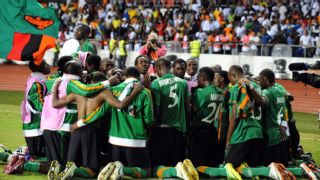 When Stophira Sunzu stepped up to convert Zambia's ninth penalty kick - the 18th of a gruelling shootout -- in their victory over the fancied Ivory Coast in Libreville, he scored a goal and secured a victory that paid tribute to the nation's greatest team, who had perished 19 years earlier, off the coast of Gabon. "It won't be eleven against eleven out there," Zambia great Kalusha Bwalya said ahead of the final. "We'll have eleven ghosts on our side as well." In 1993, a military plane containing the Zambia team to face Senegal in a World Cup qualifier crashed in the Atlantic Ocean, killing all on board. Kalusha, that team's greatest player, had not been among them, and joined Herve Renard and the 2012 Chipolopolo generation as they walked along the Libreville shoreline, in the aftermath of a dramatic Emmanuel Mayuka-inspired semi-final victory over Ghana, to sing their soulful tribute to the country's fallen heroes. By this point, there was a sense of destiny about this Zambia team, a modest collection of players underpinned and unified by Renard's subtle pragmatism. In 2010, a largely Africa-based Zambia team had fallen to Nigeria in the quarter-finals, and none had tipped them among the favourites two years later. However, they topped their group, dispatched Sudan in the quarters, and then ousted Ghana in the semis, with Gyan missing an eighth-minute penalty to set the tone. After holding the Elephants at bay in the final, Zambia clinched the title on penalties, with Kolo Toure missing his spot kick - after Gervinho refused to step up - and then the wideman duly missing his as well after Rainford Kalaba had fluffed his lines for the Chiopolopolo. So to Sunzu, and a penalty which sealed a victory soaked in emotion, paying tribute, two decades later, to the fallen heroes of 1993. The Golden Generation Ivorian players arguably contributed to African football's biggest moments of the last decade more than any other nation. 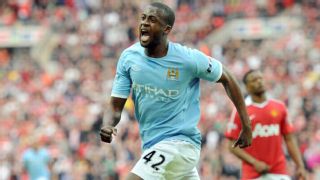 Four-time African Footballer of the Year Yaya Toure scored the only goal of the game in both the FA Cup semi-final and final in 2011 as Manchester City ended their 35-year wait for a major honour, and was again influential as they won the title in 2012. While Didier Drogba made his name as a big-match winner in the previous decade, he too enjoyed his finest hour in 2012, when he scored a late equaliser and then the decisive penalty as Chelsea defeated Bayern Munich in the Champions League final to become London's first European champions. However, despite their wealth of talent, the Ivory Coast national team had consistently flattered to deceive, with their 'Golden Generation' tag beginning to weigh heavy around Elephants' necks. They were defeated Afcon finalists in 2006 and 2012, semi finalists in 2008, and reached the knockout stages in 2013, but they'd never conquered the big one, leaving a nation waiting and wondering whether a first Afcon title since 1992 would ever come. By 2014, following a third consecutive failure to escape the World Cup group stage, that all changed, as the federation turned to Renard to help the perennial underachievers get over the line. On the fields of Gabon in early 2015, they did so in some style, as the Frenchman - demonstrating the ruthlessness and rigour he'd showed earlier in his career - consigned several big names to the international scrapheap, alongside the retired Drogba, and imbued a seam of new blood into the squad. Fresh faces such as Serge Aurier and Eric Bailly stepped into key roles, while Wilfried Bony replaced Drogba to lead the line. 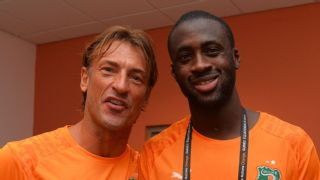 By the time of the final against Ghana in Bata, the Ivorians, accustomed to so many unlikely failures over the years, could hardly bear to dream of ending the hoodoo, not least when Sylvain Gbohouo suffered an injury ahead of the final and had to be replaced by error-prone veteran Copa Barry. After a 0-0 draw, and a tepid extra time, the match went to penalties, where the Ivorians went 2-0 down after missing their opening kicks. Fear set in, and at this point, Gervinho, who had been earlier substituted, couldn't bear to watch, turning his chair away from the dugout, towards the fans, with his head in his hands. Defeat, it appeared, was bearing down on the Ivorians like the hound of heaven. For once, however, fate was smiling on the Elephants; they scored their next nine consecutive penalties while Ghana, who had seen sure victory slip from them after misses from Afriyie Acquah and Frank Acheampong, lost it 9-8 in sudden death. It fell to Copa, so often the pariah, so often a figure of fun over the years, to fire home the decisive spotkick and draw a line under so many years of underachievement and regret. Finally, the Ivory Coast had that collective success to complement their individual achievements at club level. A change of power Almost three years on, it still feels too early to evaluate - truly - whether Ahmad Ahmad is significantly more healthy for African football than his predecessor, Issa Hayatou. However, in March 2017, when the Cameroonian football administrator was out-voted as CAF President - following 29 years at the helm - it felt as though the winds of change were sweeping through African football, and could finally eradicate some of the continent's sports' greatest woes. 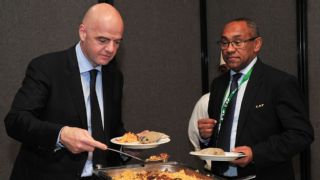 Hayatou, who had been elected as CAF President in 1988, and to the FIFA executive committee in 1990, had held a statesman's aura, respected, revered, and feared, within the African football community. However, he was dispatched by Ahmad, who clinched an emphatic 34-20 victory at the CAF congress in Addis Ababa, following his long-term ally and former FIFA President Sepp Blatter into retirement. While the indictments haven't followed Hayatou quite as they did some of his peers at the pinnacle of football leadership, there was a hope - if not an expectation - that Ahmad would introduce greater transparency and improved governance to the continental game. However, 2019 has proved to be a tricky year for the new man and his committee, with the Malagasy questioned by French authorities investigating corruption allegations in June, and latterly terminating the billion-dollar television contract with Lagardere Sports, which has led to a partial blackout of African football being broadcast. Salah sends Egypt to Russia Perhaps no African nation - sportingly, if not politically - has endured a greater rollercoaster over the last decade than Egypt. After winning the 2010 Nations Cup - their third in a row - the team would embark on a significant decline that coincided with the retirement of many key members of their Golden Generation, while the nation would enter the Arab Spring, which severely affected the country's football and sporting structures. The nadir was reached in 2012, in Port Said, where 74 supporters attending an Al Masry-Al-Ahly match were killed and over 500 injured in coordinated violence linked to the country's political situation. Mohamed Aboutrika, perhaps the country's greatest player, was one of three Ahly stars to announce his retirement in the immediate aftermath of that match, having cradled dying supporters in his arms. The politically aware Aboutrika, who is currently exiled in Qatar, was ultimately persuaded to return to Pharaohs action, but it wasn't until 2018 that fans were allowed back into stadiums to watch domestic action. Egypt missed out on three subsequent Nations Cups - in 2012, 2013 and 2015 - but inspired by an emerging generation, headlined by Mohamed Salah and overseen by Hector Cuper, they returned in style for the 2017 edition, reaching the final only to be narrowly beaten by Cameroon. By the time of his return to the Premier League, with Liverpool, in June 2017 for an initial €42 million, Salah had already stepped into Aboutrika's shoes as Egypt's talisman, and ensured a 100 percent start to World Cup qualification with goals against Congo-Brazzaville away and Ghana at home. 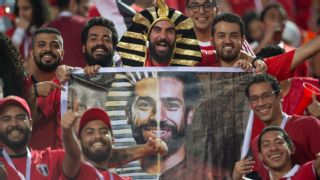 After being defeated by Uganda - and an inspired Denis Onyango - in Kampala, Salah finally got the better of the Mamelodi Sundowns keeper in Alexandria, netting a fifth-minute winner to leave Egypt needing victory against Congo at home to secure a World Cup berth. It would be their first appearance at the tournament since 1990, with the nation's Golden Generation failing to translate their continental dominance to a spot at the high table. Despite taking a 1-0 lead - via Salah - against the Diables Rouges, the visitors struck back through Arnold Bouka Moutou in the 87th minute, leaving Egypt facing an away trip to Ghana in which they may have required a result. Salah, however, was determined to drag the Pharaohs to Russia on home soil, and when Mahmoud Hassan was brought down in the box in stoppage time, it was the former Chelsea man who stepped up to slam home an emphatic left-footed penalty in the 94th minute to secure qualification. It sent the country into raptures, prompting thousands of fans to take to the streets, bedecked in red, white and black, honking their car horns in triumphant jubilation, and pouring into Tahrir Square - where the protests against President Mubarak had taken place at the pinnacle of the Arab Spring seven years previously. After the tragedy, the turmoil, and the tumult, Egypt were back in the big time, and for the first time since Aboutrika, the country had a symbol around whom the populace could unite, regardless of background, class or political leaning.
|

